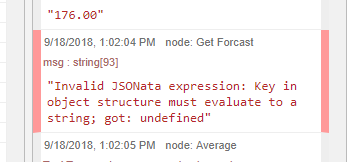Maybe not so fast - so going through that - they end up giving up on the FTP node as it is broken and instead head down the curl path.
The last message posted though has a flow in it - talking about jsonata - when i paste that and run it i get an error

And here is the flow that produces it.
[{"id":"270fb26c.d03b6e","type":"inject","z":"4c1ba2a9.c1050c","name":"Additional Info","topic":"","payload":"ftp://ftp.bom.gov.au/anon/gen/fwo/IDV10753.xml","payloadType":"str","repeat":"","crontab":"","once":false,"onceDelay":"","x":410,"y":600,"wires":[["fe0a2149.3aa49"]]},{"id":"fe0a2149.3aa49","type":"exec","z":"4c1ba2a9.c1050c","command":"curl","addpay":true,"append":"","useSpawn":"false","timer":"","name":"","x":540,"y":600,"wires":[["54df56f4.4b8218"],[],[]]},{"id":"54df56f4.4b8218","type":"xml","z":"4c1ba2a9.c1050c","name":"","attr":"","chr":"","x":670,"y":580,"wires":[["8fe62ffa.54b33"]]},{"id":"de2110e4.c03fa","type":"debug","z":"4c1ba2a9.c1050c","name":"","active":true,"console":"false","complete":"payload","x":1010,"y":580,"wires":[]},{"id":"8fe62ffa.54b33","type":"change","z":"4c1ba2a9.c1050c","name":"Get Forcast","rules":[{"t":"move","p":"payload.product.forecast[0].area[52].forecast-period","pt":"msg","to":"weather","tot":"msg"},{"t":"set","p":"payload","pt":"msg","to":"{ \t\"today\":{\t \"date\":msg.weather[0].\"$\".\"start-time-local\" ,\t msg.weather[0].text[1].\"$\".type:product.forecast[0].area[52].\"forecast-period\"[0].text[1].\"_\"\t },\t\"tomorrow\": {\t \"date\": msg.weather[1].\"$\".\"start-time-local\",\t msg.weather[1].element[1].\"$\".type: msg.weather[1].element[1].\"_\",\t msg.weather[1].element[2].\"$\".type: msg.weather[1].element[2].\"_\" & \" degrees\",\t msg.weather[1].element[3].\"$\".type: msg.weather[1].element[3].\"_\" & \" degrees\",\t msg.weather[1].text[1].\"$\".type: msg.weather[1].text[1].\"_\" & \" chance of rain\"\t },\t\"two\": {\t \"date\": msg.weather[2].\"$\".\"start-time-local\",\t msg.weather[2].element[1].\"$\".type: msg.weather[2].element[1].\"_\",\t msg.weather[2].element[2].\"$\".type: msg.weather[2].element[2].\"_\" & \" degrees\",\t msg.weather[2].element[3].\"$\".type: msg.weather[2].element[3].\"_\" & \" degrees\",\t msg.weather[2].text[1].\"$\".type: msg.weather[2].text[1].\"_\" & \" chance of rain\"\t },\t\"three\": {\t \"date\": msg.weather[3].\"$\".\"start-time-local\",\t msg.weather[3].element[1].\"$\".type: msg.weather[3].element[1].\"_\",\t msg.weather[3].element[2].\"$\".type: msg.weather[3].element[2].\"_\" & \" degrees\",\t msg.weather[3].element[3].\"$\".type: msg.weather[3].element[3].\"_\" & \" degrees\",\t msg.weather[3].text[1].\"$\".type: msg.weather[3].text[1].\"_\" & \" chance of rain\"\t },\t\"four\": {\t \"date\": msg.weather[4].\"$\".\"start-time-local\",\t msg.weather[4].element[1].\"$\".type: msg.weather[4].element[1].\"_\",\t msg.weather[4].element[2].\"$\".type: msg.weather[4].element[2].\"_\" & \" degrees\",\t msg.weather[4].element[3].\"$\".type: msg.weather[4].element[3].\"_\" & \" degrees\",\t msg.weather[4].text[1].\"$\".type: msg.weather[4].text[1].\"_\" & \" chance of rain\"\t},\t\"five\": {\t \"date\": msg.weather[5].\"$\".\"start-time-local\",\t msg.weather[5].element[1].\"$\".type: msg.weather[5].element[1].\"_\",\t msg.weather[5].element[2].\"$\".type: msg.weather[5].element[2].\"_\" & \" degrees\",\t msg.weather[5].element[3].\"$\".type: msg.weather[5].element[3].\"_\" & \" degrees\",\t msg.weather[5].text[1].\"$\".type: msg.weather[5].text[1].\"_\" & \" chance of rain\"\t },\t\"six\": {\t \"date\": msg.weather[6].\"$\".\"start-time-local\",\t msg.weather[6].element[1].\"$\".type: msg.weather[6].element[1].\"_\",\t msg.weather[6].element[2].\"$\".type: msg.weather[6].element[2].\"_\" & \" degrees\",\t msg.weather[6].element[3].\"$\".type: msg.weather[6].element[3].\"_\" & \" degrees\",\t msg.weather[6].text[1].\"$\".type: msg.weather[6].text[1].\"_\" & \" chance of rain\"\t}\t}","tot":"jsonata"}],"action":"","property":"","from":"","to":"","reg":false,"x":830,"y":580,"wires":[["de2110e4.c03fa"]]}]
Guess i will rip it apart and see if i can see anything
I know nothing abut jsonata - is there an easy expression builder etc ??
Craig


 )
)

